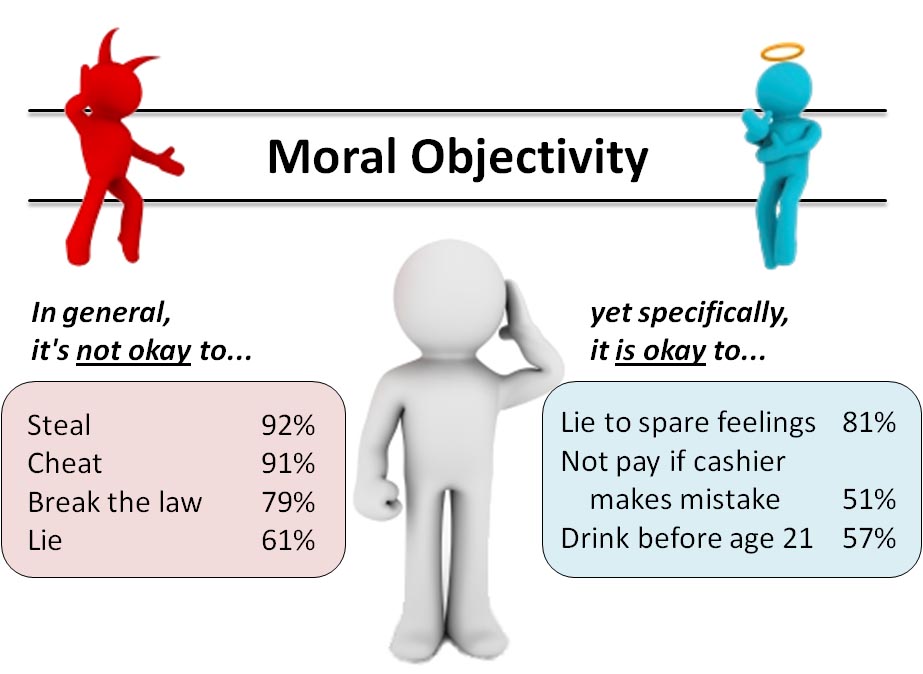It doesn’t take a rocket scientist or a Harvard education to know that distinguishing between right and wrong can be complex and murky and hard to pull off successfully.
Or is it?
An overwhelming majority of Americans (91%) actually say it’s fairly easy for them personally to know how to behave when faced with a moral fork in the road.
- Do I hire my qualified friend for a job – or an even more qualified stranger?
- Do I let my 12 year old daughter buy an iphone if she earns the money herself?
- Do I attack a mugger if I fear he may be armed?
- Do I go out of my way to return a bag of money that I find lying in the road?
We face (little and big) moral dilemmas every day in our own lives and if not, through pop culture, politics and current events (Google: Sophie’s Choice; Joe Paterno; Tim Tebow; Newt Gingrich; John Edwards; John F. Kennedy, and on and on). And, almost all Americans say others may struggle with how to handle these kinds of situations, but I don’t.
And here’s what most interesting… even though we personally feel we have clarity in distinguishing between right and wrong, America as a nation is divided on whether morality is objective (45%) – or relative (55%), i.e., dependent on the situation, the person, the traditions, the practices, the culture, and many other variables.
So today in this post, let’s talk about moral objectivity. A majority of Americans do not feel it is ever okay to:
- Steal (92%),
- Cheat (91%),
- Break the law (79%), or
- Lie (61%).
We re-asked some comparable questions, but this time with a little situational context. As the context changed, so did our respondents’ answers. In other words, those who say it’s not okay to lie feel there are occasions in which lying is okay.
| Okay to Lie in these Circumstances | ||
| Among Those who Say Lying is not Okay | Among all Respondents | |
| Spare someone’s feelings | 70% | 81% |
| Take a day off from work | 48% | 61% |
| Make an excuse to a client if late delivering on a project | 38% | 53% |
| Get access to a special event | 36% | 50% |
| Impress someone at a job interview | 35% | 48% |
| Get out of a speeding ticket | 32% | 45% |
| Answer questions under oath | 15% | 29% |
And some of those who say it’s not okay to steal still can envision occasions in which it is:
| Okay to Steal in these Circumstances | ||
| Among Those who Say Stealing is not Okay | Among all Respondents | |
| Not offer to pay if a cashier mistakenly doesn’t charge you | 49% | 51% |
| Take office supplies for your own personal use | 44% | 47% |
| Accept a kick back to hire someone | 32% | 34% |
| Misstate your income knowingly on your taxes | 33% | 35% |
| Shoplift if you can’t afford an item | 17% | 21% |
And many of those who say you should not break the law still say it may be okay to:
| Break the Law in these Circumstances | ||
| Among Those who Say Breaking the Law is not Okay | Among all Respondents | |
| Drink before the age of 21 |
49% |
57% |
| Keep an unregistered handgun in your house |
36% |
43% |
| Plagiarize something for work or school |
26% |
30% |
| Allow under-age children to drink alcohol in your house |
30% |
36% |
| Use a handicapped spot in a parking lot even if you don’t have a disability |
23% |
27% |
| Take performance enhancing drugs |
18% |
23% |
| Drink alcohol and drive a car |
17% |
22% |
So, perhaps it all depends on how we think about lying, stealing and law breaking in the abstract , but how it changes when we visualize specific situations.
Now for fun, in your free (what’s that?) time, check out these mostly famous moral dilemmas and these ones too… is it clear how you would act in these situations?

Leave a Reply